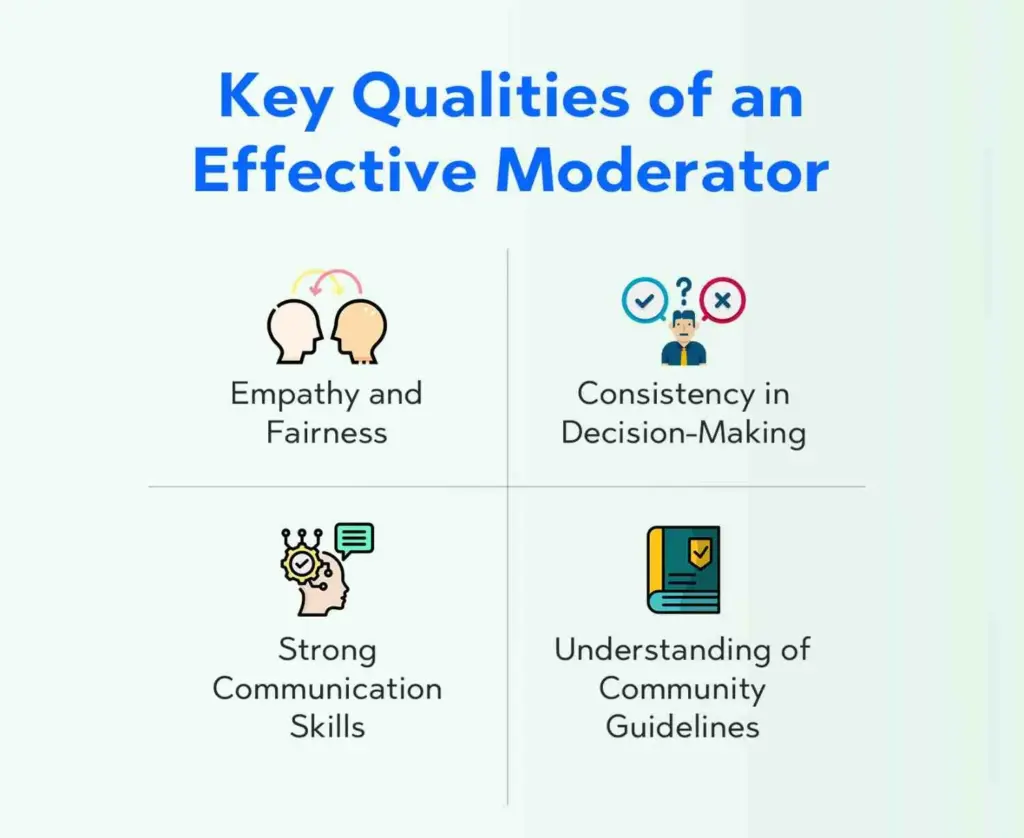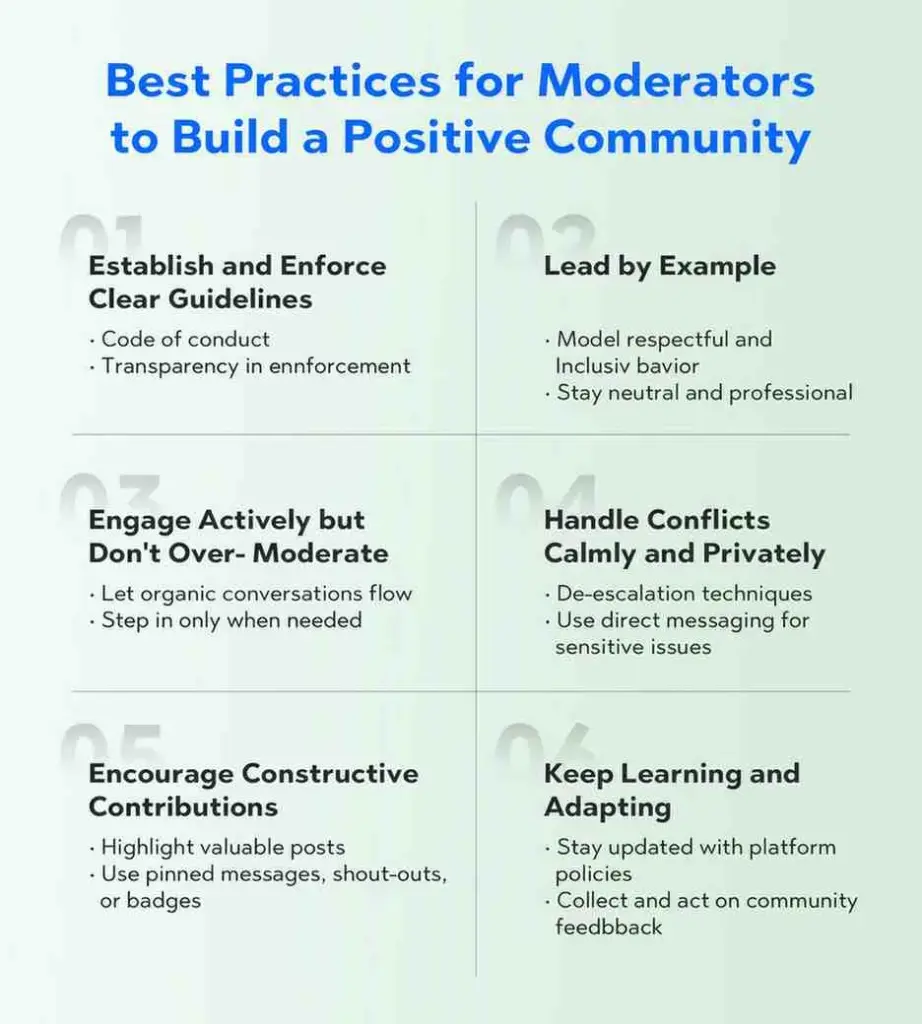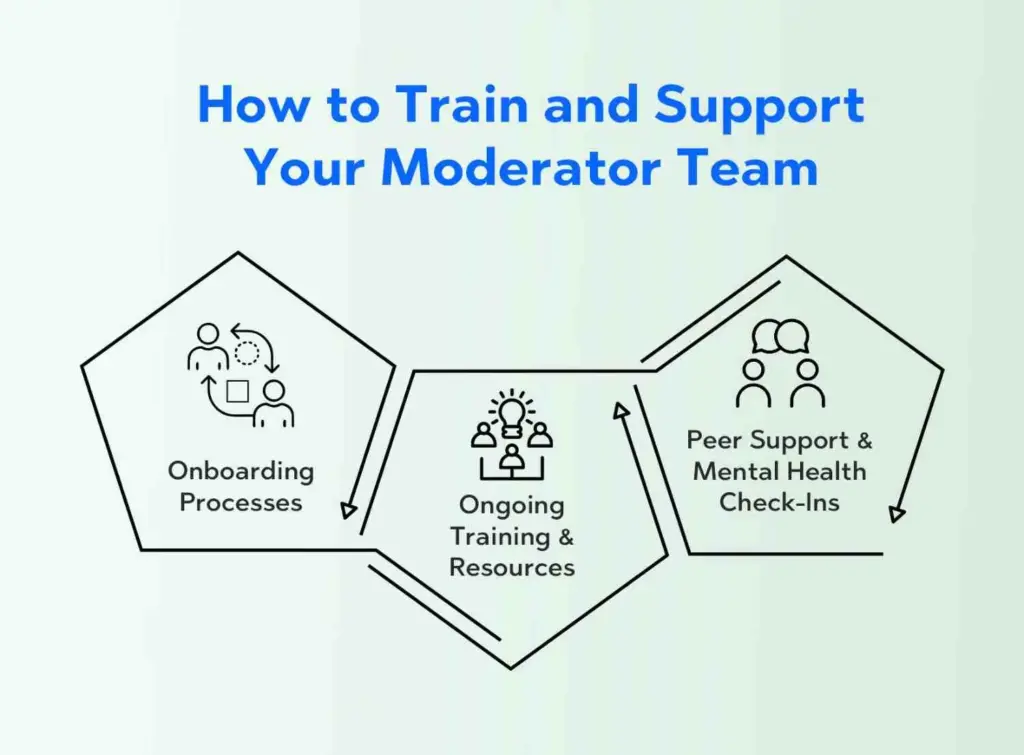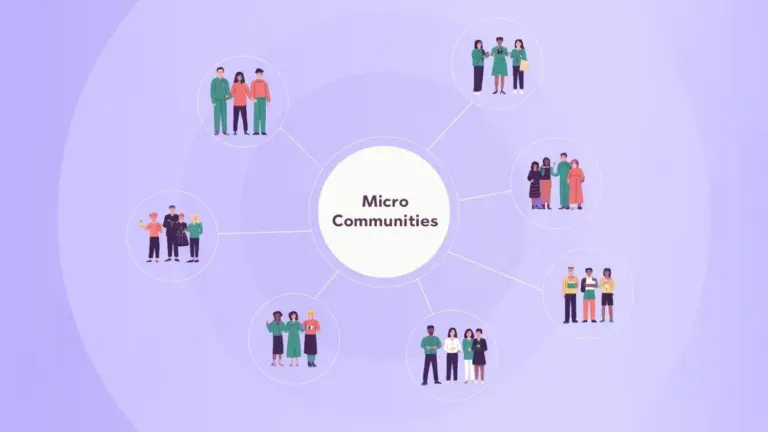Building a Positive Online Community: Best Practices for Moderators
Healthy online communities foster belonging, support, and collaboration—elements that boost engagement, trust, and even user well-being. At the heart of this lies the moderator’s role: shaping community culture, ensuring respectful discourse, and steering conversations toward positivity. By enforcing fair rules and modeling constructive behavior, moderators act as custodians of connection and inclusivity. They make sure conversations stay healthy, discourage negativity like trolling or harassment, and encourage welcoming interactions. Clear community moderation best practices, powerful online community management tips, and unwavering commitment to building positive community norms create spaces where users feel valued, safe, and eager to take part. That foundation is what allows communities—and brands—to truly thrive.
Why Is Moderation Crucial in Online Communities?
A proactive moderation strategy forms the backbone of every positive community-building effort. It:
1. Ensures Safety and Respect
Moderation protects users from harmful content—hate speech, explicit material, and misinformation—and cultivates a respectful environment.
2. Encourages Constructive Participation
By guiding discussions, moderators ensure conversations stay relevant and valuable—boosting engagement and reducing noise.
3. Prevents Toxic Behavior and Misinformation
Swiftly addressing trolling, spam, or false claims stops negativity from spreading and reinforces trust in the community and brand.
These community moderation best practices aren’t optional—they’re essential for fostering a trustworthy, engaging space where users want to stay and contribute.
Key Qualities of an Effective Moderator

To deliver online community management tips, moderators should bring more than just patience. Here’s what every great moderator should embody:
1. Empathy and Fairness
Understanding different viewpoints helps moderators act with compassion and impartiality—earning members’ respect.
2. Consistency in Decision‑Making
Applying rules evenly and transparently builds trust. Consistent moderation prevents confusion and backlash.
3. Strong Communication Skills
Clear guidelines, polite warnings, and concise explanations reinforce boundaries without alienating members.
4. Understanding of Community Guidelines
Deep familiarity with the rules—why they exist and how to enforce them—empowers moderators to act confidently and correctly.
With these traits, moderators can apply community moderation best practices while pushing forward and building positive community objectives.
Best Practices for Moderators to Build a Positive Community

Here are the top community moderation best practices and online community management tips to help moderators foster positivity:
1. Establish and Enforce Clear Guidelines
1. Code of conduct: Draft transparent rules covering behavior, language, and content.
- Transparency in enforcement: Explain why actions happen—public warnings or private messages—keeping trust intact.
2. Lead by Example
- Use respectful, inclusive language—even when moderating.
- Remain neutral in disputes, acting as an impartial guide rather than a judge.
3. Foster Inclusivity and Belonging
- Encourage diverse voices: Invite different perspectives and experiences.
- Address bias quickly: Step in against discrimination or microaggressions.
4. Engage Actively but Don’t Over‑Moderate
- Let conversations flow—only intervene when necessary.
- Identify hotspots early to reduce friction before it escalates.
5. Handle Conflicts Calmly and Privately
- Use de-escalation: Take a neutral, empathetic tone to reduce tension.
- Flag intense or personal issues to private channels, keeping them out of public view.
6. Encourage Constructive Contributions
- Highlight thoughtful posts using pinned messages or badges.
- Recognize members in newsletters or chat shout-outs to reinforce positive behavior.
7. Keep Learning and Adapting
- Stay current—monitor updates to policies and best practices.
- Solicit community feedback and tweak moderation methods based on real experiences.
Applying these community moderation best practices ensures your community stays respectful, welcoming, and aligned with your brand’s core values.
Tools and Techniques to Support Effective Moderation
Effective moderation hinges not just on people but also on tools. Leverage the following online community management tips and community moderation best practices:
1. Automated Moderation Tools
- AI filters for spam, hate speech, or profanity.
- Rule-based triggers that flag potential violations.
- Real-time alerts for moderators to respond swiftly.
2. Reporting and Escalation Systems
- User flagging to spotlight issues.
- Escalation paths to senior moderators or admins.
- Clear workflows ensure timely resolution.
3. Analytics to Track Engagement and Issues
- Dashboards showing flagged posts, moderator response times, and conversation health
- Metrics to identify toxicity trends or friction points.
- Data-driven decisions improve transparency and moderation quality.
Pairing human moderation with smart tools makes your approach scalable, fair, and reliable.
Common Challenges Moderators Face and How to Overcome Them
Even seasoned moderators face hurdles. Here are typical issues and how to address them using community moderation best practices:
1. Trolls and Spam
- Challenge: Low-effort or disruptive posts clutter conversations
- Solution: Use automated spam filters and fast-response moderation routines.
2. Biased or Emotional Responses
- Challenge: Emotional bias may skew moderation.
- Solution: Train moderators to use emotion‑check protocols and get peer reviews on tough decisions.
3. Burnout and Mental Fatigue
- Challenge: Constant exposure to negativity impacts mental health.
- Solution: Rotate shifts, offer peer support, monitor stress levels, and provide mental health resources.
By incorporating online community management tips to support moderator well-being, you preserve both community health and moderator morale.
How to Train and Support Your Moderator Team

A strong moderation team must be well-prepared, supported, and continuously growing. Here’s how to make that happen:
1. Onboarding Processes
● Provide clear orientation on rules, tools, and escalation paths.
● Pair new moderators with experienced mentors for hands-on support.
2. Ongoing Training & Resources
● Conduct regular workshops, policy updates, and tool training.
● Maintain a shared knowledge base with guidelines and best practices.
3. Peer Support & Mental Health Check‑ins
● Schedule routine wellness discussions and feedback sessions.
● Encourage open dialogue about challenges and coping strategies.
With proactive training and support, moderators become confident, resilient ambassadors of building positive community values.
Conclusion
Moderators are the guardians who turn online spaces into thriving, inclusive communities. By mastering community moderation best practices and deploying effective online community management tips, they safeguard positivity, foster connection, and uphold brand integrity. Their success lies in empathy, consistency, and ongoing growth. A well-moderated space invites engagement and trust—and that’s what makes a truly building positive community shine.
FAQs
1. What does an online community moderator do?
They enforce rules, resolve conflicts, guide conversations, and shape community culture.
2. How can moderators prevent toxic behavior in communities?
Use clear policies, fair enforcement, automated filters, and swift conflict resolution.
3. What are the top tools for community moderation?
AI moderation tools, user-reporting systems, engagement dashboards, and workflow platforms.
4. How do you create a safe space in online communities?
Implement inclusive guidelines, moderate harmful content, support diverse voices, and foster accountability.
5. How should moderators deal with trolls or spammers?
Use automated flags, warnings, temporary bans, and consistent enforcement.
6. What are the signs of moderator burnout, and how can you avoid it?
Signs: irritability, fatigue, withdrawal. Avoid it with rest, peer support, mental health resources, and balanced schedules.
7. How do you train new moderators effectively?
Provide onboarding, mentors, documented resources, ongoing learning, and feedback mechanisms.
8. Should moderation rules be public or private?
Public rules help enforce transparency; private guidelines aid internal consistency—use both strategically.






